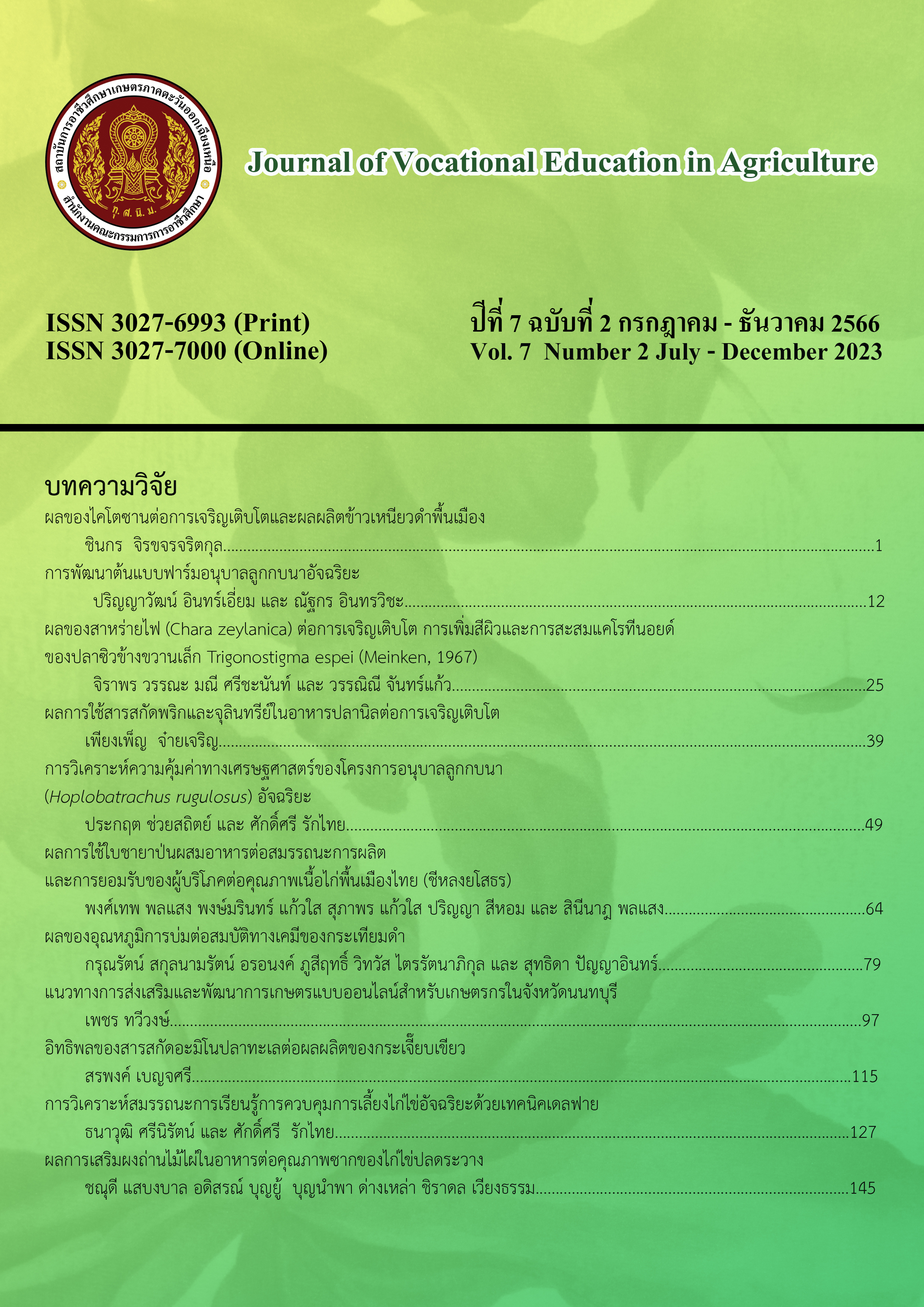The Guideline of the Online Agricultural Extension and Development for the Farmer in Nonthaburi Province
Main Article Content
Abstract
The objectives of this research were to study 1) social and economic conditions of farmers, 2) needs, channels, and learning format in online agricultural learning extension of farmers, 3) satisfaction of farmers, 4) factors relating to satisfaction, 5) problems and suggestions of farmers. and 6) propose the online agricultural extension and development guidelines. This research was a survey research. They population of this study was 115 farmers who participated in online agricultural extension and development activities organized by Nonthaburi Provincial Agricultural Extension Office in 2021. The sample size of 89 people was determined by using Slovin formula with the error value of 0.05. Data were collected by using questionnaires and were analyzed by using statistics such as frequency, percentage, minimum value, maximum value, mean, standard deviation, and multiple regression analysis.
The results of the research found that 1) 58.4% of farmers were female with the average age of 50.28 years old, and 86.5% participated in online trainings 1-5 times in 2021. All farmers make a living by growing crops and have fishing and husbandry with 16.9% and 10.1%, respectively. 2) Majority of the farmers needed the knowledge extension regarding marketing at the highest 94.4% of them identified the time of the activity to be half day in the morning. They agreed at the high toward every online teaching activity. 3) Overall, farmers were satisfied at the high level regarding knowledge instructors, content, channel and media, knowledge transfer recipients, and results. 4) learning in action activities and activities to stimulate interests were the influential factors on overall satisfaction of the farmers. 5) The problems is the lack of skills in using online platform and inconsistent internet signal. The suggested that there should be the training on the online platforms usage. And 6) The guideline of the online agricultural extension has 5 activities: attention, interest, desire, conviction, and action, with the primary goal of transforming farmers in farming for the better.
Article Details

This work is licensed under a Creative Commons Attribution-NonCommercial-NoDerivatives 4.0 International License.
The content and information in articles published in the Journal of Vocational Education in Agriculture are the opinions and responsibility of the article's author. The journal editors do not need to agree or share any responsibility.
Articles, information, content, etc. that are published in the Journal of Vocational Education in Agriculture are copyrighted by the Journal of Vocational Education in Agriculture. If any person or organization wishes to publish all or any part of it or to do anything. Only prior written permission from the Journal of Vocational Education in Agriculture is required.
References
Coronavirus Diseases 2019 : COVID-19. (2020, 29 February). Royal Gazette. Vol. 137 Chapter 17 p.5. (in Thai)
Wilson, M. C. & Gallup, G. G. (1955). Extension teaching methods and other factors that influence adoption of agricultural and home economics practices. Washington: U.S. Government Printing Office.
Berlo, D. K. (1960). The process of communication: An Introduction to Theory and Practice. New York: Holt, Rinehart, & Winston.
Yamane, T. (1967). Statistics: An Introductory Analysis. 2nd Ed. New York: Harper and Row.
Larppuwanart, N. (2017). The Development of Model on Organic Agriculture Market Management in Accordance with Creative Economy by Internet Marketing, (Doctoral dissertation, Silpakorn University). (in Thai)
Sareunrum, S. (2019). Agriculture Marketing Strategies: A Lesson Learned from Thai Young Farmer, (Independent Study, Mahidol University). (in Thai)
Wayo, W., et al. (2020). Online LearningUnder the COVID-19 Epidemic: Concepts and applicationsof teaching and learning management. Regional Health Promotion Center 9 Journal, 14(34), 285-298. (in Thai)
Sangkasuth, S. & Trimek, J. (2021). Students’ Satisfaction towards Appropriate Online Teaching and Learning Models in the Epidemic of COVID-19 of Rangsit University. In RSU National Research Conference 2021 on Social Science and Humanity, Education, Management, and Arts (p. 1-12). 30 April, 2021, Pathumthani, Thailand. (in Thai)
Thonglao, A., et al. (2021). The Study of Students’ Satisfaction Towards Online Learning Management: Kasetsart Unersity, KaphaengSaen Campus in First Semester of Academic Year 2020. Journal of Liberal Arts and Service Industry, 4(2), 617-632. (in Thai)
Bangert, A. W., (2006). Identifying factors underlying the quality of online teaching effectiveness: An exploratory study. Journal of Computing in Higher Education. 17(2), 79–99.
Charungkiatikul, S. (2018). The Twenty-First Century Skills. Available from https://www. trueplookpanya. com/blog/content/66054. Accessed date: 12 January 2023. (in Thai)
Febrianto, P. T., et al. (2020). Implementation of Online Learning during the Covid-19 Pandemic on Madura Island, Indonesia. International Journal of Learning, Teaching and Educational Research, 19(8), 233-254.

